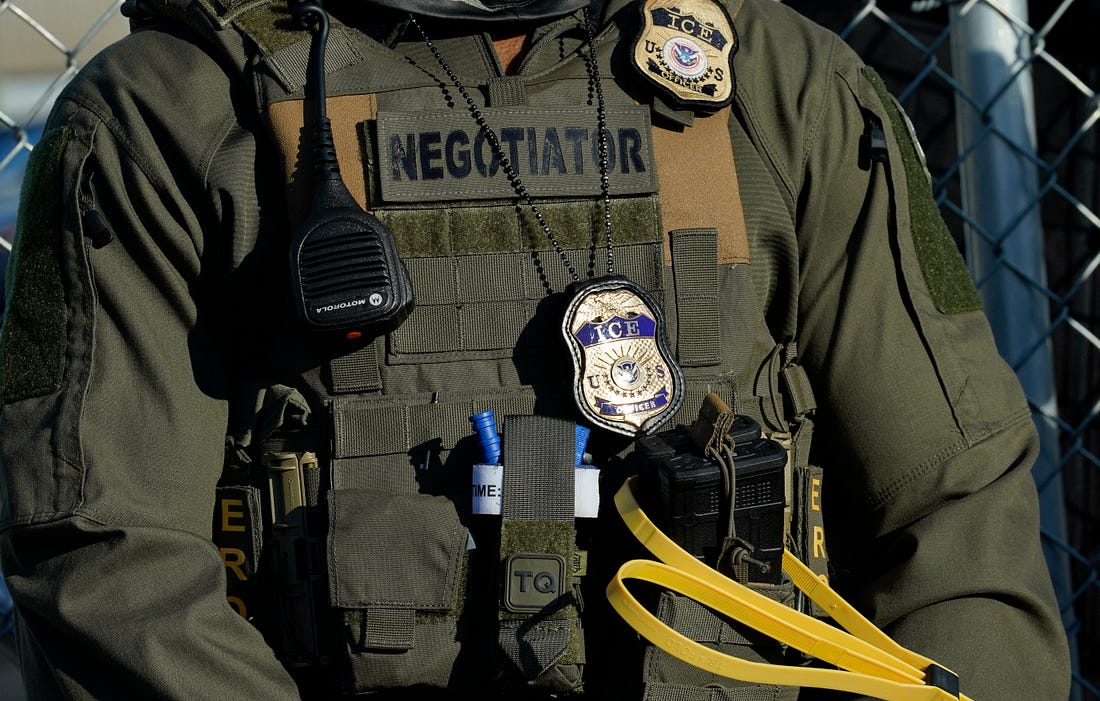|
 |
The Shame of What We’ve Become
Trump’s deportation regime is a stain on our country. The bigger stain is that we voted for it.
A tough lede to read, from the AP:
Democratic Sen. John Fetterman of Pennsylvania was meeting last week with representatives from a teachers union in his home state when things quickly devolved.
Before long, Fetterman began repeating himself, shouting and questioning why “everybody is mad at me,” “why does everyone hate me, what did I ever do” and slamming his hands on a desk, according to one person who was briefed on what occurred.
As the meeting deteriorated, a staff member moved to end it and ushered the visitors into the hallway, where she broke down crying. The staffer was comforted by the teachers who were themselves rattled by Fetterman's behavior, according to a second person who was briefed separately on the meeting.
If these stories are true, we hope Sen. Fetterman can get the help he needs. Happy Thursday.
The Point Is Cruelty
by William Kristol
Emma Lazarus’s poem engraved on the pedestal of the Statue of Liberty calls the United States of America the land of “world-wide welcome,” the nation of “the golden door.”
We are not that today.
On Monday, a 19-year-old was stopped in Dalton, Georgia, for making a right turn on a red light. Ximena Arias-Cristobal, an honors graduate of Dalton High School, is a student in good standing at Dalton State College. But she is an undocumented immigrant. ICE was informed of her apprehension for this minor misdemeanor, and Ximena was promptly transported with chains around her wrists and ankles to the Stewart Detention Center near Columbus, more than three hours away.
Ximena was brought here in 2010, as a 4-year-old, by her parents, who were themselves undocumented. The family has lived law-abidingly in Georgia ever since. Her father owns a construction company, pays taxes, and, because their daughter is undocumented, has been paying out-of-state tuition for her at college.
The district’s representative in the Georgia State House, Kacey Carpenter, is a Republican. He wrote a letter to the judge on Ximena’s behalf. And he remarked to local media:
The conversation has always been that we need to get hard criminals out of the country. Unfortunately, the people that aren’t hard criminals are getting caught up in the wash. It seems like we are much better at catching people that are committing misdemeanors than people that are actually a danger to society.
Carpenter is right, of course. But it’s hard to imagine he’s surprised. “Mass deportation” is what Trump promised. This is just an example of his policy at work. The question we must ask ourselves is: How could we have gotten to this place?
A more ambitious manifestation of the policy became visible Tuesday in news reports that the Trump administration planned to start deporting migrants originally from certain Asian countries to detention in Libya. Lawyers for detainees rushed to court to ensure that their clients weren’t sent to Libya or any other third country without some form of due process, as has been required by the courts.
Yesterday, in Boston, U.S. District Judge Brian E. Murphy reminded the Trump administration that he had already barred the Department of Homeland Security from deporting someone to a third country without having given them a chance to challenge their removal and seek protection in the United States.
“This case,” Judge Murphy wrote, “presents a simple question: Before the United States forcibly sends someone to a country other than their country of origin, must that person be told where they are going and be given a chance to tell the United States that they might be killed if sent there?” The answer, Murphy said, consistent with previous judicial rulings and with “common sense [and] basic decency” is yes.
But the Trump administration denies this. The administration is appealing this and other cases, making the argument that they have the unilateral right to deport anyone they detain to any place they chose.
This position of the Trump administration (and its practice in El Salvador) prompted a powerful cri de coeur yesterday from my former Weekly Standard colleague, Matt Labash. Writing on his substack (to which you should subscribe!), Labash asked:
Regardless of what the courts say, how is that plan okay? When did it become acceptable for us to have our government put even illegal immigrants into foreign prisons for the crime of trying to come to America? You don’t have to be for illegal immigration (and I’m most definitely not) to find that abhorrent.
Labash continued:
Every day, a fresh assault by this administration on what we used to think of ourselves as standing for. Which seemingly doesn’t want us to think of ourselves in those terms anymore. As aspiring authoritarians often don’t. Their power comes from shattering all former notions of yourself. But rather, they want you to think of yourself as they think of themselves, as a people capable—as they have proven again and again—of much greater cruelty.
Labash’s lament echoes Lincoln’s in a (private) letter 170 years ago: “Our progress in degeneracy appears to me to be pretty rapid.”
There is no more striking instance of degeneracy than Trump’s mass deportation policy. But as painful as the sight of this moral rot is the recognition that we voted for it.
The question before us is: Now that we see this policy in action, do we have the moral clarity and courage to reject it?
